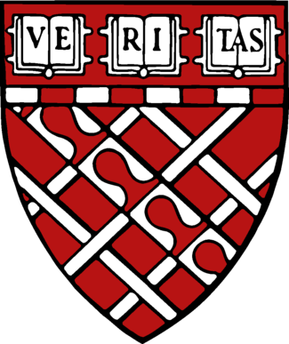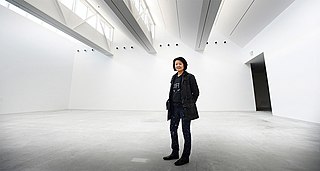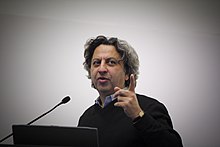
The Aga Khan Award for Architecture (AKAA) is an architectural prize established by Aga Khan IV in 1977. It aims to identify and reward architectural concepts that successfully address the needs and aspirations of Muslim societies in the fields of contemporary design, social housing, community development and improvement, restoration, reuse and area conservation, as well as landscape design and improvement of the environment.

The Harvard Graduate School of Design (GSD) is the graduate school of design at Harvard University, a private research university in Cambridge, Massachusetts. It offers master's and doctoral programs in architecture, landscape architecture, urban planning, urban design, real estate, design engineering, and design studies.

Archnet is a collaborative digital humanities project focused on Islamic architecture and the built environment of Muslim societies. Conceptualized in 1998 and originally developed at the MIT School of Architecture and Planning in co-operation with the Aga Khan Trust for Culture. It has been maintained by the Aga Khan Documentation Center at MIT and the Aga Khan Trust for Culture since 2011.
Landscape urbanism is a theory of urban design arguing that the city is constructed of interconnected and ecologically rich horizontal field conditions, rather than the arrangement of objects and buildings. Landscape Urbanism, like Infrastructural Urbanism and Ecological Urbanism, emphasizes performance over pure aesthetics and utilizes systems-based thinking and design strategies. The phrase 'landscape urbanism' first appeared in the mid 1990s. Since this time, the phrase 'landscape urbanism' has taken on many different uses, but is most often cited as a postmodernist or post-postmodernist response to the "failings" of New Urbanism and the shift away from the comprehensive visions, and demands, for modern architecture and urban planning.
Giannina Braschi is a Puerto Rican poet, novelist, dramatist, and scholar. Her notable works include Empire of Dreams (1988), Yo-Yo Boing! (1998) and United States of Banana (2011).

Sarah M. Whiting is an American architect, critic, and academic administrator. Whiting is currently Dean and Josep Lluís Sert Professor of Architecture at Harvard Graduate School of Design, in addition to being a founding partner of WW Architecture, along with her husband, Ron Witte. She previously served as Dean and William Ward Watkin Professor of Architecture at Rice School of Architecture. In addition to her work as an academic administrator, Whiting is most commonly identified as an intellectual figure within the field of architecture's "post-critical" turn in the early 2000s.
Mónica Ponce de León is a Latina architect, educator, and dean of the Princeton University School of Architecture.

Mitchell Joachim is an architect and urban designer. He is the Co-Founder of Terreform ONE, and an Associate Professor of Practice at NYU. Previously he was the Frank Gehry Chair at University of Toronto and a faculty member at Pratt, Columbia, Syracuse, Washington, The New School, and the European Graduate School.

Diébédo Francis Kéré is a Burkinabé-German architect, recognized for creating innovative works that are often sustainable and collaborative in nature. In 2022, he became the first African to receive the Pritzker Architecture Prize. Educated at the Technical University of Berlin, he has lived in Berlin since 1985. Parallel to his studies, he established the Kéré Foundation, and in 2005 he founded Kéré Architecture. His architectural practice has been recognized internationally with awards including the Aga Khan Award for Architecture (2004) for his first building, the Gando Primary School in Burkina Faso, and the Global Holcim Award for Sustainable Construction.

Walter J. Hood, is an American designer, artist, academic administrator, and educator. He is the former chair of landscape architecture at the University of California, Berkeley, and principal of Hood Design Studio in Oakland, California. Hood has worked in a variety of settings including architecture, landscape architecture, visual art, community leadership, urban design, and in planning and research. He has spent more than 20 years living in Oakland, California. He draws on his strong connection to the Black community in his work. He has chosen to work almost exclusively in the public realm and urban environments.
Ecological urbanism draws from ecology to inspire an urbanism that is more socially inclusive and sensitive to the environment. It is less ideologically driven than green urbanism or sustainable urbanism. In many ways, ecological urbanism is an evolution and a critique of landscape urbanism, which argues for a more holistic approach to the design and management of cities. This type of urbanism has a central scope of four main objectives: compactness, complexity, efficiency, and stability. This model of urbanism strives to tackle the current challenges of society by intertwining sustainability and urban occupation models. "Ecological urbanism" was coined by architect and planner Miguel Ruano in his 1998 book Eco-Urbanism: Sustainable Human Settlements, 60 Case Studies. The term first appeared as "EcoUrbanism", which is defined as "the development of multi-dimensional sustainable human communities within harmonious and balanced built environments". The term was used later in April 2003 at a conference at the University of Oregon, and again in 2006 in a paper by Jeffrey Hou. Mohsen Mostafavi used the term in the 2007 publication Intervention Architecture and in a lecture at the Canadian Centre for Architecture. Today, ecological urbanism is recognized as a formal academic research topic. Notably, the Harvard University Graduate School of Design has conducted a conference, held an art exhibition, and published a book all centered around ecological urbanism.
The Holcim Foundation for Sustainable Construction is a non-profit organization. Its goal is to raise awareness of the role that architecture, engineering, urban planning and construction have in achieving a sustainable built future. The organization encourages and rewards sustainable responses to the technological, environmental, socioeconomic, and cultural issues affecting building and construction. The Holcim Foundation for Sustainable Construction promotes thought leadership on a greener, smarter, circular, and more inclusive built environment.

Kongjian Yu, is a landscape architect and urbanist, writer and educator, commonly credited with the invention of Sponge City concept, and winner of the International Federation of Landscape Architects’ Sir Geoffrey Jellicoe Award in 2020. Received his Doctor of Design Degree from Harvard Graduate School of Design in 1995, Doctor Honoris Causa from Sapienza University of Rome in 2017 and Honorary Doctorate from Norwegian University of Life Sciences in 2019, Yu was elected to the American Academy of Arts and Sciences in 2016.

Toshiko Mori is a Japanese architect and the founder and principal of New York–based Toshiko Mori Architect, PLLC and Vision Arc. She is also the Robert P. Hubbard Professor in the Practice of Architecture at the Harvard University Graduate School of Design. In 1995, she became the first female faculty member to receive tenure at the GSD.
Sheila Kennedy is an American architect and professor at the Massachusetts Institute of Technology (MIT) who is known for including green technology, such as flexible solar cells, into her designs. She is interested in using technology in new ways and in re-examining traditional ways of building and designing structures.
Renata Holod is an American art historian, architecture historian and archaeologist, specializing in the Islamic world. She is the College for Women Class of 1963 Term Professor Emerita in the Humanities in the History of Art Department, and current Curator of the Near East Section, Museum of Archaeology and Anthropology at the University of Pennsylvania. Holod has taught at University of Penn since 1972, and was a visiting Clark Professor at Williams College in 2002. She has conducted and/or directed archaeological fieldwork in Iraq, Afghanistan, Syria, Iran, Morocco, Turkey, Ukraine, and Tunisia.

Ana Maria Duran Calisto is an Ecuadorean architect, urbanist, and environmental planner who founded Estudio A0 with her husband and partner the architect Jaskran "Jazz" Kalirai in Quito, Ecuador.
Eve Blau is a historian and scholar who teaches at the Graduate School of Design at Harvard University as a Professor of the History and Theory of Urban Form and Design, as well as Director of Research. Blau has contributed to scholarship on the history of architecture and urban design. In 2015 she received the Victor Adler State Prize from the Austrian Ministry of Science, Research, and Economy for her work on Red Vienna and her book The Architecture of Red Vienna: 1919-1934. The Victor Adler State Prize is given for scholarship that is distinguished by its interdisciplinary breadth, use of innovative methods, contemporary historical questions, and that is widely published. In 2018, she was named Fellow of the Society of Architectural Historians and in 2022, she was inducted into the American Academy of Arts & Sciences.

Mariam Issoufou Kamara is a Nigerien architect. Her designs focus on open living spaces and make use of locally produced materials available to African communities: cement, recycled metal and raw earth.

Peter H. Christensen is the Arthur Satz Professor of the Humanities at and Associate Dean of the University of Rochester College of Arts Sciences and Engineering. He has held a Guggenheim Fellowship, the Berlin Prize and is a former member of the Institute for Advanced Study. He is the Ani and Mark Gabrellian Director of the Humanities Center at the University of Rochester. He has been visiting faculty at Cornell University and serves on the board of the Society of Architectural Historians. He is the editor for the "Humanities in the World" series at the University of Rochester Press.












